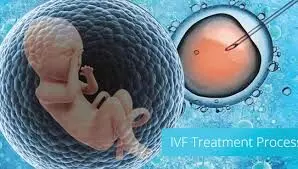- Home
- /
- Trending-News
- /
- Fertility specialist...
Fertility specialist calls for inclusion of IVF in health insurance plans

A Consultant Obstetrician and Gynaecologist, Dr Olusanjo Moses, has called for the inclusion of In vitro fertilisation (IVF) in health insurance plans to enable more individuals and couples achieve their dream of having a baby.
Moses, a fertility specialist and Co-Founder of M2 Specialist Hospital, said this in an interview with the newsmen on Thursday in Lagos.
In vitro fertilisation (IVF) is one of the assisted reproductive technology (ART) available to help people with fertility problems have a baby.
IVF helps with fertilisation, embryo development, and implantation, so that one can get pregnant
It works by using a combination of medicines and surgical procedures to help sperm fertilise an egg, and help the fertilised egg implant in the uterus.
According to the World Health Organisation (WHO), infertility affects millions of people – and has an impact on their families and communities.
WHO said that approximately one in every six people of reproductive age worldwide experience infertility in their lifetime.
Moses, however, bemoaned the absence of fertility care in national health coverage benefit packages, acknowledging that IVF technologies are still largely unavailable, inaccessible and unaffordable for many citizens.
He stressed the need to facilitate national policy to incorporate infertility within an enabling legal and policy framework.According to him, the fees for a cycle of IVF include medicines, procedures, anaesthesia, ultrasounds, blood tests, lab work, and embryo storage.
He emphasised that the exact cost of a single IVF cycle varies and runs into millions of naira.
“IVF is expensive, and most of our health insurance does not cover it. And therefore, many of our women and our couples have to pay out of pocket.
“If there could be legislation in such a way that even if it is just a co-payment, a part payment, or 50 percent of the cost of IVF can be borne by the health insurance,.
“I think it will go a long way in reducing the burden of financial expenditure on our population,” he said.
He added that medicines, equipment, and consumables used for the techniques were imported, noting that tax exemptions on some equipment and investment in local production of medicine and consumables would help reduce the cost of IVF.
Moses disclosed that to expand access to IVF services in the country, M2 Specialist Hospital was established in Lagos with fertility and reproductive health at the heart of its operation.
He disclosed that the hospital was on a mission to provide top-notch, patient-centred fertility treatments and reproductive health care using the latest advancements in evidence-based medicine.
On how IVF works, Moses said that medication is first given to make several of the patient’s eggs mature and ready for fertilisation.
“Then the doctor takes the eggs out of the patient’s body and mixes them with sperm in a lab to help the sperm fertilise the eggs. Thereafter, they put one or more fertilised eggs (embryos) directly into the uterus.
“Pregnancy happens if any of the embryos implant in the lining of the uterus,” he said.
Moses added that babies conceived through IVF are not different from babies conceived naturally, noting that awareness and uptake of IVF were increasing among couples.
Reports from an international NGO, Planned Parenthood, showed that IVF has many steps and takes several months to complete the whole process.
It was noted that it sometimes works on the first try, but many people need more than one round of IVF to get pregnant.
It added that IVF definitely increases the chances of pregnancy for people with fertility problems, warning that there’s no guarantee and saying, "Everyone’s body is different, and IVF won’t work for everyone.”
Data from the WHO revealed that assisted reproduction technologies (ART) have been available for more than three decades, with millions of children born worldwide from ART interventions such as IVF.




